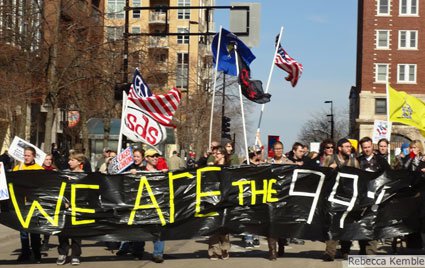On Saturday, March 10 2012 the AFL-CIO organized a rally at the Wisconsin State Capitol dubbed “Reclaim Wisconsin.” It was held to commemorate the one year anniversary of the illegal passage of Act 10, the bill that effectively eliminated collective bargaining for public employees.
Large contingents of public and private sector union members and supporters came from all over the state to demonstrate their determination to unseat Governor Scott Walker, his Lt. Governor Rebecca Kleefisch, and four more Republican senators. Their aim: to restore the right of public employees to collectively bargain for working conditions, salary and benefits.
This single issue is so important to organized labor that the largest public sector unions in the state – Wisconsin Education Association Council, the teachers’ union, and the American Federation of State, County and Municipal Employees (AFSCME) – have based their endorsement of a Democratic challenger to Scott Walker in the upcoming recall election on a promise to restore the provision in the next biennial budget, and to veto any budget that does not include this restoration.
Weeks before the deadline for candidates to declare their intention to run and without the organized opinions of their rank and file members, WEAC and AFSCME leadership have already endorsed Kathleen Falk because she alone has made this pledge. This decision has stirred up passion and debate within union locals about their opinions being left out of state-level decisions.
The most basic gripe that Wisconsinites have with Scott Walker and the Republicans controlling the legislature this year is that they are not listening to the voices of their constituents. Critics of the WEAC and AFSCME endorsements of Falk point out a similar failure to respect and listen to those they represent in making important political decisions.
One small but extremely significant union is taking pains to work through the process of deciding what to do after the Walker recall has been officially certified and an election is called. Members of the University of Wisconsin – Madison Teaching Assistants Association which led the first protest action last year that sparked off a three week occupation of the Capitol are in the midst of debates about a potential Walker challenger.
TAA members are in deep discussion about the specific criteria by which they should make any endorsement decision. Last month members passed a resolution outlining those criteria, but a vote to repeal the resolution has been called for March 20 because some feel that no candidate could meet those criteria and they would be left with a situation in which nobody receives their endorsement.
The tension between standing firmly on and fighting for principles (e.g. the unqualified support of the restoration of collective bargaining) and compromising those principles to endorse an “elect-able” candidate is the bane of all independent political movements in two-party America. And yet in Wisconsin this year, we have seen and experienced breaks in the two-party stranglehold over our politics, most notably with the stunning recall victory and now candidacy of Lori Compas for the State Senate seat of Majority Leader Scott Fitzgerald.
Throughout this past year, enormous numbers of Wisconsinites who had been marginalized and alienated from formal political processes have stepped up to participate in political action. Whether through the recall signature gathering process that happened in the dead of winter throughout the state, by traveling to Madison to testify at public hearings on outrageous legislative proposals by the legislature, or from organizing in their own neighborhoods to educate and update each other about the latest excess of the Walker regime, Wisconsin citizens are gaining confidence in their collective ability to impact political discourse and shape the course of events.
Last Saturday was a beautiful, sunny day with temperatures reaching 60 degrees. There was a laid-back, celebratory feeling in the air and it was great to see so many folks out marching. (Most estimates have the crowd between 50,000 and 65,000.) But as much as we have awoken to the takeover of our state government this year, I worry that people will go back to sleep after the dust has settled on the recalls.
In the rally speeches and amongst the crowd, there was a general sense that after the Democrats "reclaim" Wisconsin by winning elections everything will get better. But the truth is, the privatization of state agencies and many other democracy-eroding initiatives began under Democratic Governor Jim Doyle with the support of some sitting Democratic senators and assembly reps. Many of the more pernicious moves that Walker has made to consolidate administrative power in the Governor’s office over this past year will not just go away, much like all of those executive orders signed by Bush and never rescinded by Obama.
So while rallying in the warm sunshine and having the confidence of one million signatures for the recall of Scott Walker in the bag felt good and is something to celebrate, I liked our defiant rallies last year much better. There was an unscripted, creative outpouring of original thought and action that felt much more promising in terms of actually breaking out of this corrupt, crumbling two-party political system that threatens to lull us back to inaction with a few Democratic Party election victories.
Rebecca Kemble is an Anthropologist who studied decolonization in Kenya. She serves on the Board of the US Federation of Worker Cooperatives and is a founding member of the Wisconsin Citizens Media Cooperative.
